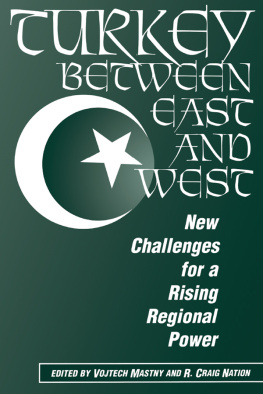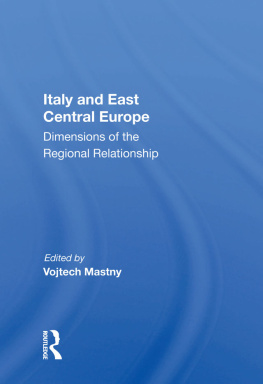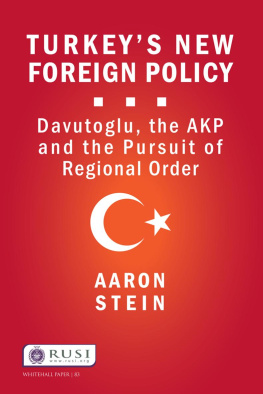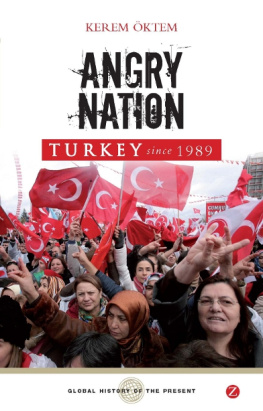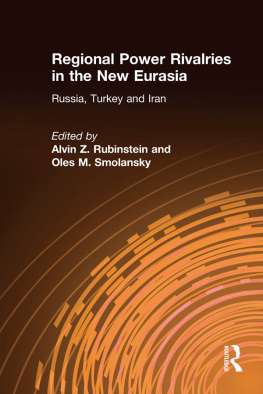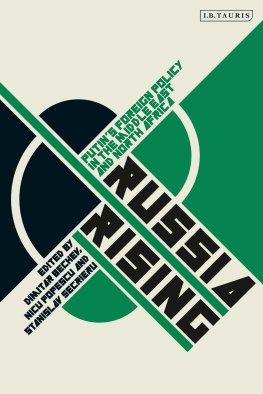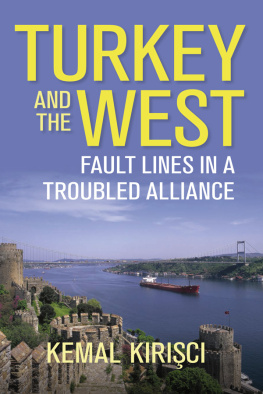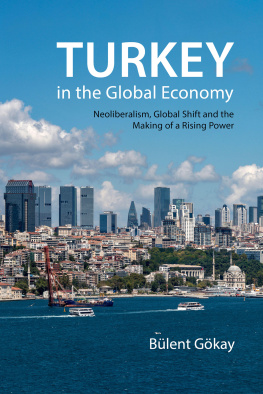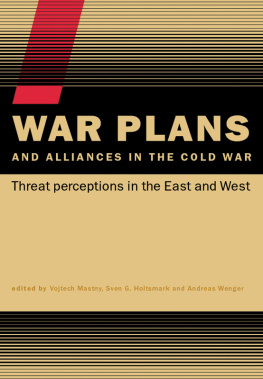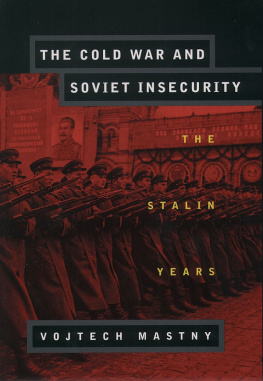Turkey Between East and West
Turkey Between
East and West
New Challenges for a
Rising Regional Power
EDITED BY
Vojtech Mastny and R. Craig Nation
First published 1996 by Westview Press
Published 2018 by Routledge
52 Vanderbilt Avenue, New York, NY 10017, USA
2 Park Square, Milton Park, Abingdon, Oxon OX14 4RN
Routledge is an imprint of the Taylor & Francis Group, an informa business
Copyright 1996 Taylor & Francis
All rights reserved. No part of this book may be reprinted or reproduced or utilised in any form or by any electronic, mechanical, or other means, now known or hereafter invented, including photocopying and recording, or in any information storage or retrieval system, without permission in writing from the publishers.
Notice:
Product or corporate names may be trademarks or registered trademarks, and are used only for identification and explanation without intent to infringe.
Library of Congress Cataloging-in-Publication Data
Turkey between East and West : new challenges for a rising regional power / edited by Vojtech Mastny and R. Craig Nation.
p. cm.
Includes bibliographical references (p.) and index.
ISBN 0-8133-2420-30-8133-3412-8 (pbk)
1. TurkeyForeign relations. 2. TurkeyForeign economic relations. 3. TurkeyPolitics and government1980-. I. Mastny, Vojtech, 1936-. IL Nation, R. Craig.
DR477.T79 1996
327.561-dc20
95-39563
CIP
ISBN 13: 978-0-8133-3412-7 (pbk)
Contents
, Kemal H. Karpat
, Bruce R. Kuniholm
, Duygu Bazolu Sezer
, R. Craig Nation
, Clement H. Dodd
, lkay Sunar
, Ziya ni
, N. Blent Gltekin and Aye Mumcu
, Heinz Kramer
, Faruk en
The modern Turkish Republic was born at the end of the First World War as the negation of the collapsing Ottoman empire. Its founder, Mustafa Kemal (Atatrk), abandoned the ancient imperial capital, Istanbul, in favor of Ankara, replaced the Ottoman constitutional monarchy with republican institutions under the guidance of a single ruling party, launched a radical secularization campaign, and made clear his desire to adapt the new Turkey to the ways of the West.
During the cold war era Turkey appeared to be firmly anchored to Europe. As a pillar of the NATO alliance in a highly sensitive region it was considered to be an essential strategic partner. The tradition of single party rule was abandoned, and though the domestic environment remained troubled, movement toward political pluralism seemed to be inexorable. From the early 1960s, the goal of gradual association with the European Community was placed on the agenda. This period also saw hundreds of thousands of Turks permanently relocate in western Europe as a migratory work force, giving rise to a host of new and complex social and interpersonal interactions. The opening of the Turkish economy during the 1980s, associated with prime minister Turgut zal, integrated the national economy more closely with western markets and gave rise to something of an economic boom. zal himself spoke of his country, somewhat unguardedly, as the Japan of West Asia.
The optimistic sense of future prospects to which these dynamics gave rise was naturally transferred to evaluations of Turkeys potential role in the post-Cold War environment. The breakup of the USSR eliminated a centuries-old common border with a centralized Russian state and seemed to transform Turkeys strategic situation. The emergence of newly independent states of Turkic and Islamic heritage in Central Asia and the Caucasus created a new field of interest for Turkish foreign policy and gave rise to considerable enthusiasm concerning the Turkish mission amongst the lost cousins of Turkestan. This enthusiasm was to some extent shared in the West, where the distinctiveness of the modern Turkish experience was highlighted. As a democratically governed secular state, Turkey was unique in the Islamic world. It possessed a dynamic market economy and was committed to integration with international markets. It was moreover a reliable international partner closely bound to the U.S.-led western security community. In this guise, Turkey was presented as a model to the newly emerging states of the Caucasus and Central Asia and as a bridge for interaction between East and West.
None of Turkeys aspirations have been abandoned and none of its prospects have disappeared. The enthusiasm of the late 1980s has nonetheless been tempered by a host of new and sometimes unexpected dilemmas. The rapid growth of the 1980s was accompanied by sharp social differentiation and by the 1990s it had given way to a deep recession with accompanying social tensions. In 1989 the European Community suspended consideration of Turkeys application for full membership and Ankara has since been pushed to the back of a line of new applicants, including the former communist states of eastern and central Europe. The rise of a politicized Islam in the form of the Welfare Party has called some of the assumptions of the Kemalist legacy into question and posed basic questions about Turkish identity. The limits of Turkeys capacity to sponsor transition in Central Asia and the Caucasus have quickly become apparent and in these regions a new geopolitical competition with the Russian Federation is well under way. Perhaps most important, the struggle against Kurdish separatism in the southeast has become a major domestic challenge that also poses fundamental questions about the character of the modern Turkish state.
The essays collected in this book accurately reflect the process of reflection to which these new challenges have given rise. The perspectives that are offered are diverse but there are several shared perceptions and unifying themes that emerge clearly and deserve to be emphasized. The contributors share the conviction that Turkey remains fully committed to a process of development, democratization, and integration with the West. What the dynamics of the post-Cold War era have made clear, however, is that there are major barriers that continue to stand in the way of fuller integration. Some of these barriers are familiar and in fact date back over centuries. Others are specific to the nature of contemporary economic and political developments. Although no one factor is likely to prove decisive taken by itself, an image of modernization in Turkey as linear movement toward attachment to a greater Europe has been to some extent discredited.
First, there is the legacy of underdevelopment, which the imbalanced growth of the 1980s did not succeed in overcoming. Turkish gross domestic product per capita remains little more than half that of the poorest members of the European Union (EU), the state carries a heavy long-term foreign debt burden, and state expenditures are extremely high (more than double the EU average). Turkeys strategic situation is also particularly complicated, with open-ended armed conflicts under way in adjacent areas such as Bosnia-Herzegovina and the Caucasus and a potentially volatile triangular relationship with its neighbors Syria and Iraq. The consequences of the severe military crackdown of 1980 continue to be felt, and despite the considerable progress made in institutionalizing democratic norms, Turkey has been exposed to sharp criticism for its alleged record of systematic human rights violations.


